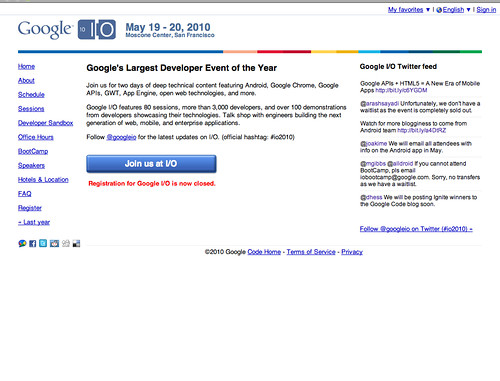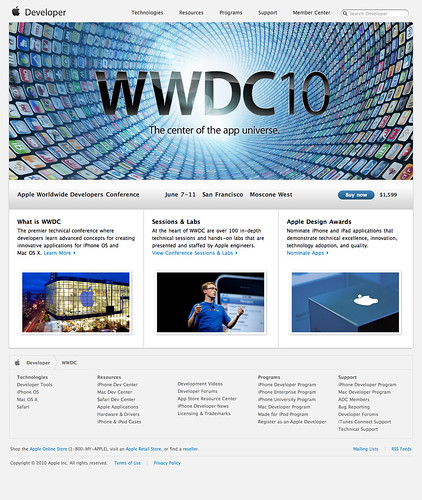In my previous post about the push and pull between marketing a site and making it usable, I try to make the case that the DU site leans too heavily toward marketing when all available data suggests usability is more important. However, on second glance, I believe I need to clarify my stance and I’ll use the home pages from Google and Apple’s developer conferences as an example.
My bias is toward a balance between marketing and usability, but the bias gives more initial credence to usability than to marketing. Why? Because you can market the hell out of a site, a subsection or page, but if people don’t know it exists, then it doesn’t matter. That’s my main criticism of the DU homepage- It looks great (which is valuable in and of itself), but it comes at the expense of visitors (prospective students) getting their tasks completed slower and more inefficiently. The most powerful way to manage this tension is to 1) ensure your basic usability requirements are met and 2) make that basic usable framework as beautiful as possible.
If we look at the Apple and Google examples on this page (you can click them to access full size versions), you see this 1-2 approach put into practice. Google is a usable site. It gives visitors a short overview of the conference, easy to find/use links to additional information and a big button to join. But is it beautiful? Has it leveraged good marketing principles? Well, it does provide user generated content to breathe some life into the page, but I would argue that it’s not an engaging presence. It has leaned too far toward usability by disregarding the power good marketing would provide.
Apple’s page also provides basic information on the conference, links to additional information and a big button to join. The difference is that Apple takes that basic usable form and packages it with more marketing muscle. The page is beautiful. It’s engaging, active and makes me want to go in order to be a part of the energy depicted. This is a page that has found a good balance between marketing an usability.
Both conferences, being as high profile as they are, will undoubtedly sell out (Google’s already has as of this writing) so you could make a counter argument that Google’s lack of marketing didn’t hinder them. In fact, they likely saved money and time by avoiding the marketing point of view. True enough. But which conference do you want to be a part of?


Leave a comment